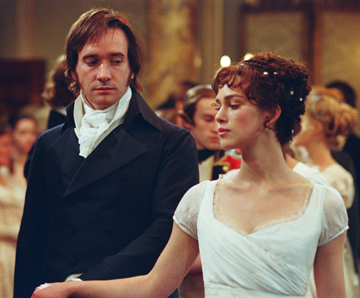 Matthew MacFadyen and Keira Knightley eye each other suspiciously during a cotillion\r\nin ‘Pride & Prejudice.’
Matthew MacFadyen and Keira Knightley eye each other suspiciously during a cotillion\r\nin ‘Pride & Prejudice.’
|
| Pride & Prejudice\r\nStarring Keira Knightley and Matthew MacFadyen. Directed by Joe Wright. Written by Deborah Moggach. Rated PG |
|
A D V E R T I S E M E N T
|
|
|
|
A D V E R T I S E M E N T
|
|
Wright for the Times
The latest Jane Austen movie exchanges polish for grit, and that’s a good thing.
By KRISTIAN LIN
The last 10 years have seen movie adaptations of every Jane Austen novel except for her Gothic-horror sendup Northanger Abbey. (Where’s the film of that, by the way? Couldn’t we get Wes Craven to do that one?) In the case of Austen’s most popular book, Pride and Prejudice, we’ve had multiple versions ranging from the 1995 BBC tv miniseries starring Colin Firth to a badly acted 2003 version that was set in contemporary Salt Lake City to the Bollywood musical Bride & Prejudice only eight months ago. If you’re going to do a straightforward film version of this novel at this late date, it had better be good. The one that comes out this week isn’t a world-beater, but it is good enough to be worth a look.
The first thing that jumps out in this movie is that the sets don’t look like the interiors of extremely expensive dollhouses but rather like actual homes where people sit on the furniture and eat off the plates. This is welcome, because Jane Austen adaptations don’t usually go in for grit. (Roger Michell’s excellent 1995 film of Persuasion is one of the few others that does.) Check out the ball at Netherfield early on — the women are glistening with sweat from the summer heat, and there’s so much noise in the hall that you have trouble catching the dialogue. It’s a pretty credible approximation of what you’d see and hear if you were transported to a party thrown by 18th-century landed English gentry. The movie’s you-are-there immediacy is a perfect tool for cutting through the fussiness and frippery of so many period films.
The filmmaker responsible is Joe Wright, whose previous directing experience has been confined to British television. (Bless them, the British regard tv as a training ground for future movie directors rather than a place for hacks.) Besides creating the atmosphere, Wright is strongest at filming the story’s big social gatherings. He uses long tracking shots to take in all the various characters as their own little dramas play out, but where most filmmakers turn this device into a showpiece, Wright goes about these unostentatiously, like we’re just strolling through the house and casually eavesdropping on their conversations as we walk by.
Keira Knightley stars as Elizabeth, and she’s shown to much better advantage here than she was in Domino. She has the right spunk for the part, though I wish she had been funnier — the character’s tendency to express herself by cracking subversive jokes is one of her best qualities. Knightley doesn’t have the pinpoint comic timing to do it justice, though to be fair, I’ve yet to see an actress in any version of this story who had it. Still, the lead actress is outshone by her male counterpart, Matthew MacFadyen (the star of the BBC spy drama Spooks, known as MI-5 in this country). Darcy’s a difficult role, and MacFadyen manages to be starchy and brusque without acting like he’s monumentally constipated.
As for the mostly British supporting cast, the record is somewhat mixed. Rosamund Pike is miscast as the optimistic Jane, while Donald Sutherland suffers from a wobbly English accent as Mr. Bennet. On the other hand, Judi Dench makes a properly formidable Lady Catherine de Bourgh, and Brenda Blethyn thankfully underplays Mrs. Bennet. The diminutive Tom Hollander gives the movie a jolt whenever he’s on screen as the hilariously constricted Mr. Collins, and the American actress Jena Malone comes close to stealing the film outright as Lydia, whose 15-year-old hormones blow through the Bennet house with gale force.
Where this movie really falls short is in its pacing. The novel is one of the most perfectly proportioned acts of storytelling in all of Western culture; its dramatic tension and effortless flow help make it eminently readable among the “great books.” This movie noticeably starts running out of gas right around the big Elizabeth vs. Darcy smackdown, a scene that huffs and puffs without quite rising to the occasion. Other Austen-derived films — Bride & Prejudice, Ang Lee’s Sense and Sensibility, Amy Heckerling’s Clueless, even Douglas McGrath’s Emma — have done a much better job of sustaining the author’s comic energy all the way to the end.
Nevertheless, Wright and screenwriter Deborah Moggach (whose work is fiercely intelligent, literate, and only occasionally too wordy) have not only taken this familiar story back to its roots but also re-envisioned it at the same time. Whereas Roman Polanski’s recent Oliver Twist offered nothing that wasn’t in various other film and tv versions of the same story, this rendition finds new facets and corners on a comic gem. Every year brings a new crop of high-toned period pieces, and usually only one of them sticks. Pride & Prejudice looks to be that one this year.
 Email this Article...
Email this Article...

